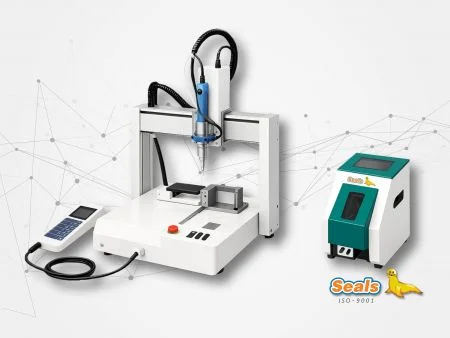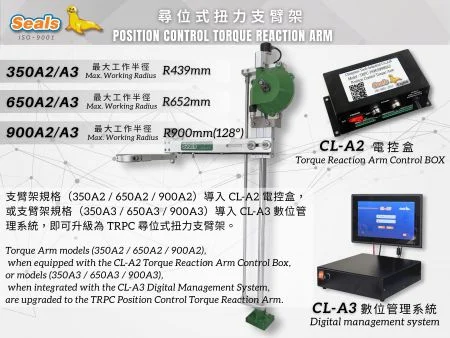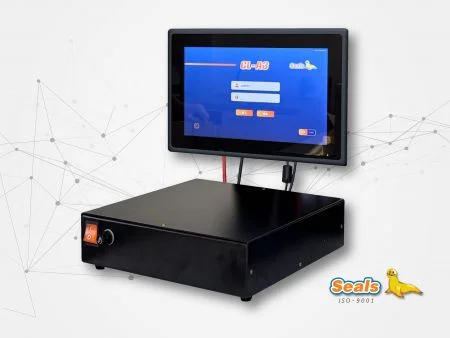CM-200→Compressor Connecting Rod Nut Tightening Application
《Case Description》
In the past, the nut-tightening process for compressor connecting rods was mostly performed manually, requiring operators to apply balanced torque on both sides simultaneously. Since the nuts are fixed on the workpiece, completing the tightening in one smooth action is difficult. Long periods of manual operation increase operator fatigue, and the tightening force varies from person to person, often resulting in inconsistent torque, uneven tightening depth, and unstable cycle times. To address these issues, we designed a dedicated automated tightening machine to ensure both nuts on the connecting rod can be tightened synchronously under identical conditions.
The CM-200 adopts a dual-spindle synchronous tightening design. Once the workpiece is placed on the fixture, the left and right clamp arms secure it in position. After pressing the dual-start buttons, both nuts are tightened simultaneously, ensuring consistent torque and improved assembly quality. The machine features a stable clamping mechanism and controlled stroke, effectively reducing errors caused by manual operation. For rework or correction, the reverse-tightening function can be activated to quickly loosen the nuts. The streamlined process shortens the fastening cycle and significantly improves quality stability, making the CM-200 an ideal solution for connecting-rod assembly lines.
This system has already been successfully implemented in multiple compressor-related manufacturing facilities, helping customers reduce manual workload, increase production efficiency, and enhance fastening consistency. Actual production feedback further confirms its stability and excellent performance as a replacement for manual operations.
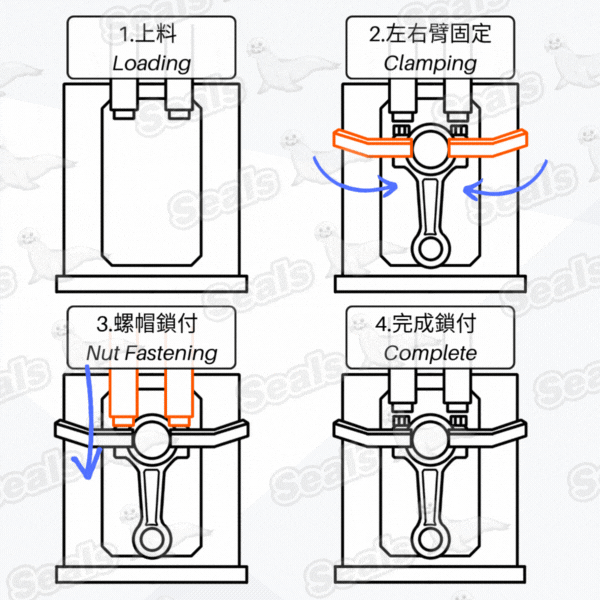
- Loading
The operator places the compressor connecting rod onto the fixture, aligning the big end with the locating surface so that both nuts match the centers of the nut sockets above. Once the rod is properly seated, the system enters the standby state for the clamping process. - Clamping
After activation, the left and right clamp arms swing inward to secure the big end of the connecting rod. This prevents movement or vibration during fastening, ensuring the nuts remain correctly positioned and torque is applied in the proper direction. - Nut Fastening
Once the rod is clamped, the dual spindles descend simultaneously, with both nut sockets engaging and tightening the nuts at the same time. The system can be set with specific torque and angle requirements, stopping automatically once the target values are reached. This allows both nuts to be tightened in a single cycle with consistent torque and stable takt time. - Complete
After fastening is complete, the spindles return to the home position and the clamp arms open to release the part. The operator then removes the fully tightened connecting rod. This creates a stable, repeatable automatic tightening cycle that improves production efficiency and ensures consistent fastening quality.
Seals Core Technologies & Practical Value
- Dual-spindle synchronous tightening:Tightens both nuts simultaneously, ensuring consistent torque and preventing deviation.
- Automatic fixture positioning:The connecting rod is automatically aligned upon placement, improving loading speed and accuracy.
- Left–right clamp arms:Secure the workpiece before fastening, preventing vibration or displacement.
- Torque/angle control:Tightening conditions can be preset; the system stops automatically once the target is reached for stable quality.
- Tightening and loosening capability:The drivers support reverse rotation, making inspection, rework, and maintenance more convenient.
- Single-operator workflow:Automated processes reduce reliance on operator skill.
- Stable cycle time for high-efficiency production:Consistent operation makes it ideal for mass-production lines.
- Reduced defect rate:Prevents common manual issues such as over-tightening, insufficient torque, or torque variation.
- High-rigidity structure:Suitable for high-torque nut tightening, providing stable and reliable operation.
- Customizable fixtures:Fixtures and clamp designs can be tailored for different connecting-rod sizes and nut specifications.
- Related Products
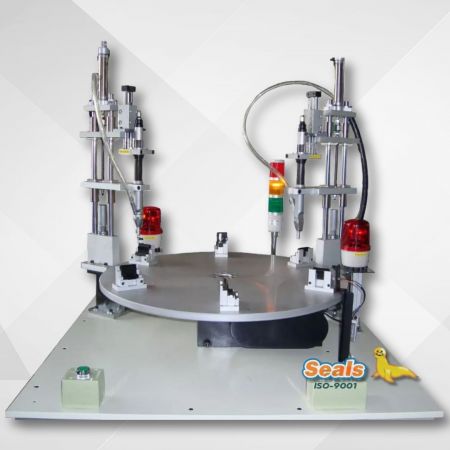
Index Table Automatic Screw Feeder Fastening System
CM-INDEX
SEALS CM-INDEX – Index Table Automatic Screw Fastening System The SEALS CM-INDEX is a high-efficiency rotary indexing screw fastening system designed for multi-station automated assembly. Available in 4, 6, or 8-station configurations, the system allows operators to focus solely on loading and unloading, while the indexing table sequentially completes all fastening tasks.Capable of integrating multiple pneumatic or electric screwdrivers for simultaneous or sequential screwdriving operations, the CM-INDEX ensures consistent workflows, enhanced quality control, and higher output. Adjustable rotation speed and reliable screw feeding mechanisms help reduce manual labor and increase productivity—making it an ideal solution for boosting automation and product value.
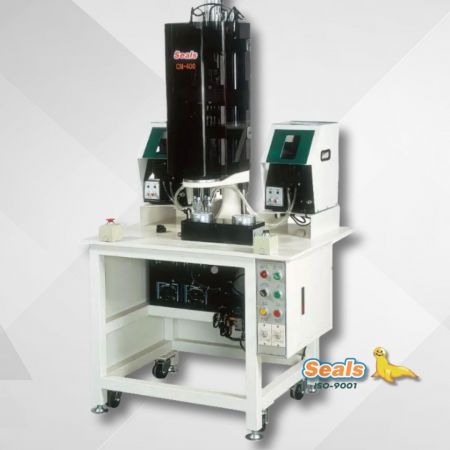
Multi Spindle Automatic Screw Feeding and Fastening Machine
CM-200~CM-800
SEALS CM-200~CM-800 multi-spindle screw fastening machines are customized solutions designed for simultaneous multi-screw operations. This system significantly increases productivity while ensuring fastening consistency and product quality. The rotary table with dual fixtures allows parallel screw fastening and loading/unloading, improving workflow efficiency and operator safety. Integrated with SEALS’ reliable screw feeders and torque-controlled electric screwdrivers, it delivers a high-performance, automated assembly solution.
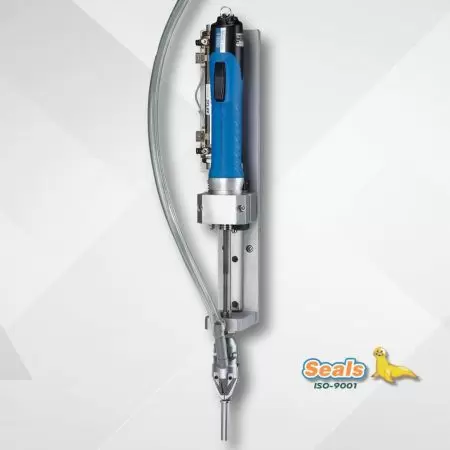
Spindle Type Automatic Screw Fastening Module
CM-100R
The SEALS CM-100R is a spindle-type automatic screw fastening module designed for seamless integration with 6-axis robot arms, SCARA robots, XY tables, gantry systems, and other automated platforms. With standardized interface plates, the module can be quickly mounted onto various automation setups.Once aligned to the screw hole, the CM-100R performs screw pushing, fastening, re-feeding, and signal feedback within 1–2 seconds. (Actual cycle time may vary depending on screw size, pitch, driver speed, and whether the screw is self-tapping.)Equipped with multiple smart sensors, the CM-100R enables real-time status monitoring and precise control through the host system. Chengmao also offers weight estimation to ensure compatibility with robotic payload requirements.Fully pre-integrated with essential components—including screw jaws, pneumatic or electric screwdriver, torque detection, slide unit, screw feeder, cable routing, and signal interface—the CM-100R minimizes engineering time and accelerates deployment.The module can be used as a standalone unit or combined in multiple-unit configurations. With smart hose management, it supports operations from multiple angles, making it ideal for both fully automated and semi-automated assembly environments.
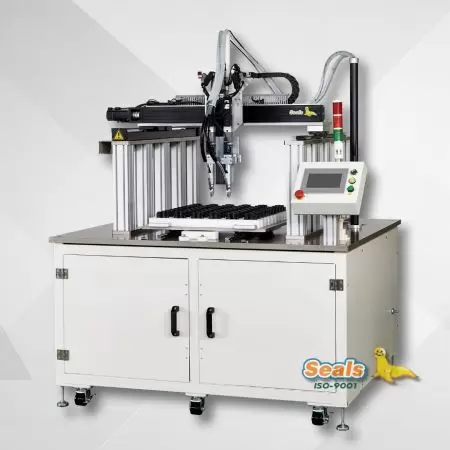
Gantry Type XY Table Automatic Screw Fastening Machine
CM-TABLE-GANTRY
The SEALS CM-TABLE-GANTRY is a floor-standing automatic screw fastening system built with a robust gantry structure, featuring dual Y-axis supports and a ball screw-driven XY servo slide table. Compared to single-arm or cantilever robots, this design provides superior repeatability, higher load capacity, and greater structural stability—making it ideal for large-scale assemblies and multi-screw fastening applications.Integrated with SEALS air-blow screw feeding technology, the system delivers screws in as fast as 0.2 seconds per cycle. The high-precision XY servo module shortens travel distances by over 60%, significantly improving production speed and efficiency.Widely used in industries such as automotive components, computer peripherals, and large plastic or metal parts, the SEALS CM-TABLE-GANTRY supports multi-point fastening and can be optionally equipped with safety light curtains for enhanced operator protection.

